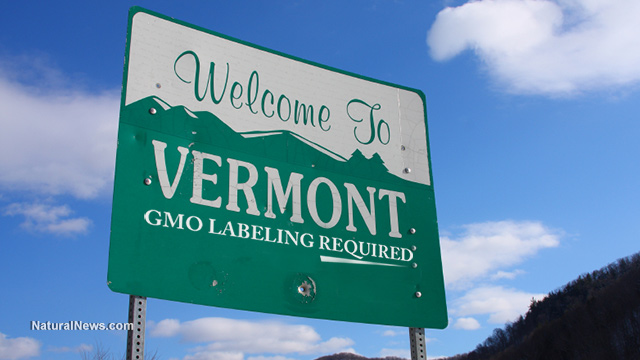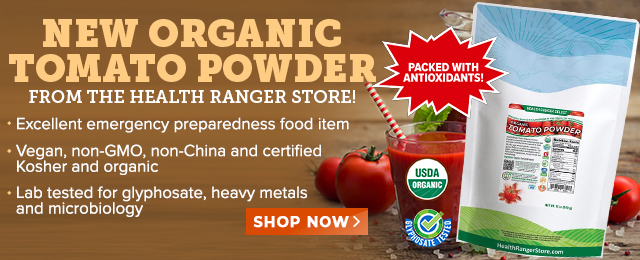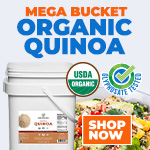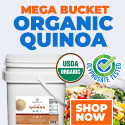Senate approves mock GMO-labeling bill, threatening genuine attempts to label food at the state level
Monday, July 11, 2016 by: Daniel Barker
Tags: GMO labeling bill, Vermont law, Monsanto

(NaturalNews) A watered-down GMO labeling bill, which critics say was largely constructed by the GMO industry itself, and is likely to undermine existing labeling legislation at the state level, has just passed the Senate and is also expected to pass in the House of Representatives.
The bill will require food manufacturers to use one of three types of labels to alert consumers to the presence of GMO ingredients in food products. The three label types include a written statement on the package, a link to a website or a phone number, or a quick response (QR) code that can be scanned by a smartphone.
The labeling options are one of the main aspects of the bill that opponents find unacceptable. The use of the QR code will limit access to ingredient information to those who own smartphones, and critics say that is exactly the reason for its inclusion in the bill.
Opponents to the bill argue that only clear text labels are appropriate, and that the other labeling options are only included to make it difficult for consumers to gain information.
The bill will effectively undermine GMO labeling laws that have been passed in states such as Vermont and many municipalities which require clear text labeling on products containing GMOs.
Another issue with the bill is the fact that it leaves loopholes for certain foods to escape being labeled as containing GMOs.
From The New York Times:
"Proponents of labeling insisted that nothing short of text on packages would do. Some, including Senator Bernie Sanders, an independent from Vermont and erstwhile presidential candidate, also raised concerns over the definition in the bill for determining which foods would require labels, a sign that if the bill becomes law, legal challenges will almost certainly follow."
Under the wording of the bill, many foods containing GMOs may be exempted from labeling. For instance, foods containing oils from GMO soybeans may not require labeling.
No one yet seems to be clear exactly what foods the labeling bill will cover, adding to the confusion and increasing the skepticism regarding its effectiveness.
A victory for the GMO food industry
One thing is clear: the passing of the bill in the Senate is a victory for the GMO foods industry, which spent approximately $100 million in 2015 alone in its efforts to oppose GMO labeling, but which also managed to have the labeling bill drafted in its favor.The labeling bill is so watered-down and GMO industry favorable, that it has been dubbed an "anti-labeling" bill.
In fact, there will be no penalties or fines imposed for non-compliance, which essentially means that the legislation not only favors the GMO industry, but also has no teeth at all to begin with.
The bill is a "fraud," according to Mike Adams, the Health Ranger. "It would not require any sort of GMO labeling that's readable by human beings, and it would destroy the only existing labeling law that requires real, honest labeling (the Vermont law)."
Consumers cannot trust the government to protect them from GMO consumption
It's becoming increasingly obvious that the government and its regulatory agencies cannot be trusted to protect the public. The vast majority – more than 90 percent – of Americans say that they want GMO labeling, but the government has failed to acknowledge this fact and act effectively to meet their demands.The best approach to protecting your family against GMO food consumption is to buy only local, organic products, and to grow as much of your own healthy, organic food as possible.
Growing organic food at home is easy and practical, even if you have limited space to work with. Raising your own food crops in a small area can be accomplished through incorporating vertical gardening techniques, for example.
The Garden Tower vertical gardening system is the perfect first step towards gaining food self-sufficiency. It's easy to use, and it's made in the U.S.A. Visit this link to find out more.
Sources:
NYTimes.com
NYTimes.com
NaturalNews.com
GMO labeling bill at FETCH.news
Get independent news alerts on natural cures, food lab tests, cannabis medicine, science, robotics, drones, privacy and more.
Take Action: Support Natural News by linking to this article from your website
Permalink to this article:
Embed article link: (copy HTML code below):
Reprinting this article:
Non-commercial use OK, cite NaturalNews.com with clickable link.
Follow Natural News on Facebook, Twitter, Google Plus, and Pinterest
- Newly released JFK files reveal Pentagon's role in creating Lyme disease and covid in the same lab
- Trump's greatest betrayal so far: Accelerating Middle East wars, silencing dissent, and serving Zionist masters
- Trump nominates VACCINE ZEALOT Susan Monarez to lead the CDC, sidelining RFK Jr.'s reform efforts
- The hidden dangers in your kitchen: How cooking methods impact diabetes, cancer and aging
- STARDUST, a secretive Israeli-US startup, plans risky solar geoengineering experiment to BLOCK OUT THE SUN
- DEADLY DECEPTION: How COVID vaccines increased mortality rates and why authorities hid the truth
- Arkansas embraces medical freedom with landmark ivermectin law
- CDC finally halts $11 billion COVID funding scam as health officials admit the ‘pandemic’ was a fraud
- Lab leak confirmed? Boris Johnson's stunning reversal on COVID origins sparks global debate
- Home gardening for preppers: A beginner's guide to growing your own food
- Analysis: The coming economic collapse, a mass uprising and Trump's three secret weapons to halt the growing revolt
- The forgotten hormone hero: How vitamin C quietly balances mood, stress and reproductive health
- Festive flavors: The sweet history, nutritional profile and health benefits of pecan pie
- Elon Musk: Aliens could be here on Earth RIGHT NOW
- Dr. Mike Yeadon releases 15-minute testimony - WATCH - about genocidal intent of COVID “vaccines”
- Unraveling the paradox: Why intelligent individuals fall prey to everyday blunders
- YouTube’s double standard: CEO defends censorship while claiming free speech champion status
- California's social media censorship law struck down: A victory for free speech or a threat to online safety?
- Newly released JFK files reveal Pentagon's role in creating Lyme disease and covid in the same lab
- Elon Musk: Aliens could be here on Earth RIGHT NOW
- Reclaim your health: How midlife exercise reverses years of inactivity
- Trump reverses course on Gaza plan, says “nobody is expelling Palestinians”
- EPA advisor admits the agency is funneling billions to climate groups ahead of Trump’s return to White House
- Big Pharma's $8 Billion bribery scheme exposed: how doctors are pushed to prescribe junk science, not heal
- Space war brewing? Russia threatens to destroy Starlink satellites
- A lack of integrity in Academia: Harvard professor found GUILTY of fraudulent research to promote CRT theory
- Survival 101: Effective EMF blocking techniques
- Rep. Nancy Mace introduces bill to ban biological males from female facilities on federal property
- Mike Adams Sermon 66: God will DESTROY ISRAEL for its wickedness
- Pilots report mysterious lights 'moving at extreme speeds' across Oregon skies
- 5 Simple steps to boost your brainpower: How to strengthen executive function in a distracted world
- Historian warns Israel may be entering an “IRREMEDIABLE DECLINE”
- Florida takes a stand: DeSantis proposes permanent ban on mRNA vaccine mandates
- RFK Jr.'s SSRI antidepressant investigation sparks liberal meltdown, exposes Big Pharma's dangerous game
- OpenAI whistleblower who dissented against how the company trained ChatGPT found dead
- Sugarcane extract superior to cholesterol-lowering drugs?
- EPA advisor admits the agency is funneling billions to climate groups ahead of Trump’s return to White House
- The Health Ranger releases “Vaccine Zombie” song and music video, using AI-animated zombies for the music video
- California's social media censorship law struck down: A victory for free speech or a threat to online safety?
- Dr. Mike Yeadon releases 15-minute testimony - WATCH - about genocidal intent of COVID “vaccines”
- The pandemic as a tool for INDOCTRINATION: Understanding “The Indoctrinated Brain” by Dr. Michael Nehls
- Mike Adams releases country western hit single: Goin’ Back in Time is Comin’ Home
- Mike Adams releases music poetry sensation: A Child of God
- RFK Jr. clears key hurdle: Sen. Susan Collins backs controversial HHS nominee, signaling a new era for health policy
- Florida takes a stand: DeSantis proposes permanent ban on mRNA vaccine mandates
- Unpacking the Lies That We’ve Been Fed – new song and music video released by Mike Adams, the Health Ranger
- Mike Adams releases new song and music video: Nothing More Disgusting Than a Globalist
- Congratulations to the FULLY UNVACCINATED as you resisted the COVID-19 PROPAGANDA MACHINE fueled by over $100 BILLION
- “Why we influenced the 2020 elections”: Facebook files reveal the coordinated effort to bury the Hunter Biden laptop story
- Michigan sheriff announces criminal investigation into 2020 election crimes, Dominion Voting Systems
- Israeli soldiers accused of even more torture and abuse in the West Bank
- Migrants are taking advantage of recent hurricanes to scam residents and loot their homes
- House Intelligence Committee calls for the ARREST and PROSECUTION of Dr. Anthony Fauci
- Peter Rost exposes Big Pharma corruption in his book “The Whistleblower: Confessions of a Healthcare Hitman”
- Red Cross issues warning to stop blood plasma donations from vaccinated people
- Scientists confirm: GENIUS brain function can be spontaneously unleashed in humans without any apparent cause
- EPA advisor admits the agency is funneling billions to climate groups ahead of Trump’s return to White House
- HYSSOP: What research reveals about the health benefits of this ancient holy herb
- Two containers with completed ballots fall out of truck in Florida
- Fully vaccinated about to see “tsunami” of illness and death, warns virologist
- Global leaders unite to clamp down on “misinformation” with UN-backed Cascais Declaration
- BREAKING: 2025 NDAA authorizes mandatory military draft of WOMEN across America… as Pentagon pursues global NUCLEAR war with both Russia and China at the same time
- Michael Yon warns of a ZIONIST TAKEOVER in Trump’s second administration
- BOMBSHELL: DNA testing kits are a SCAM to develop ethnic-specific bioweapons
- Ozempic and Wegovy weight loss drugs are injectable LIZARD VENOM PEPTIDES that may unleash a devastating wave of organ failure… side effects align with symptoms of SNAKE BITES
- Israeli soldiers accused of even more torture and abuse in the West Bank
- These 13 countries just signed an agreement to engineer a global FAMINE by destroying food supply
- NASA admits that climate change occurs because of changes in Earth’s solar orbit, and NOT because of SUVs and fossil fuels
- RFK Jr. clears key hurdle: Sen. Susan Collins backs controversial HHS nominee, signaling a new era for health policy
- Sermon 30: How Jesus reveals Caesar’s FAKE CURRENCY and FALSE AUTHORITY
- Coriander seeds: Ancient medicine backed by modern science
- Arizona officials claim Maricopa County needs 10-13 days to tabulate results of the election
Science News & Studies
Medicine News and Information
Food News & Studies
Health News & Studies
Herbs News & Information
Pollution News & Studies
Cancer News & Studies
Climate News & Studies
Survival News & Information
Gear News & Information
News covering technology, stocks, hackers, and more



"Big Tech and mainstream media are constantly trying to silence the independent voices that dare to bring you the truth about toxic food ingredients, dangerous medications and the failed, fraudulent science of the profit-driven medical establishment.
Email is one of the best ways to make sure you stay informed, without the censorship of the tech giants (Google, Apple, Facebook, Twitter, YouTube, etc.). Stay informed and you'll even likely learn information that may help save your own life."
–The Health Ranger, Mike Adams












































